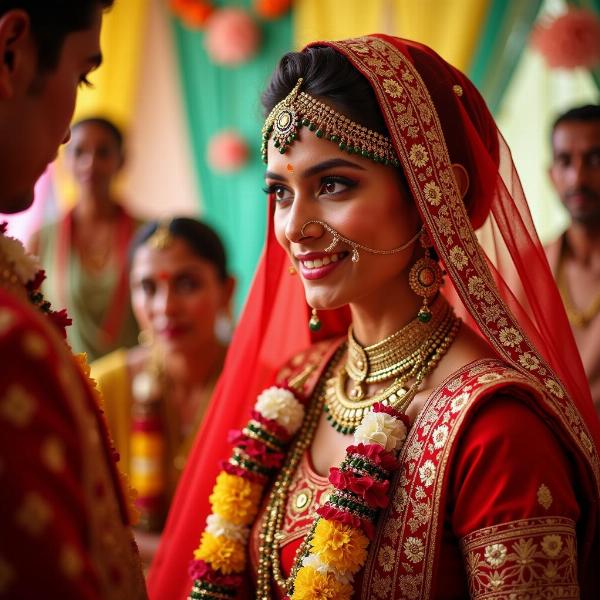Understanding the meaning of “I am single” in Hindi goes beyond a simple translation. It involves grasping the cultural context, societal expectations, and the various nuances associated with being unmarried in India. While a direct translation might suffice in some situations, knowing how to express your single status appropriately depending on the context is crucial. “I am single meaning in Hindi” is a common search query, reflecting the need for clarity in expressing this personal status.
Expressing “I am Single” in Hindi: Different Scenarios
There are several ways to convey “I am single” in Hindi, each with its own subtle implications. The most common and straightforward translation is “मैं अविवाहित हूँ” (Main avivahit hoon). This phrase is gender-neutral and suitable for formal settings. However, in casual conversations, you might hear phrases like “मैं सिंगल हूँ” (Main single hoon), which is a direct borrowing from English and widely understood, especially among younger generations.
For Women: Navigating Societal Expectations
For women, the societal context surrounding marital status is particularly significant. While “मैं अविवाहित हूँ” remains appropriate, other phrases might be used depending on the situation. For instance, “मैं कुंवारी हूँ” (Main kunwari hoon) specifically refers to an unmarried woman. However, this term can sometimes carry connotations related to age and eligibility for marriage, making it less preferable in some contexts.
For Men: Casual vs. Formal
Men also have different ways to express their single status. While “मैं अविवाहित हूँ” is the formal option, “मैं कुंवारा हूँ” (Main kunwara hoon) is the male equivalent of “kunwari” and specifically refers to an unmarried man. In informal settings, men, like women, can also use “मैं सिंगल हूँ”.
Beyond the Direct Translation
Sometimes, the context requires more than just stating “I am single.” For example, if someone is inquiring about your marital status for matrimonial purposes, you might say “मेरी अभी शादी नहीं हुई है” (Meri abhi shaadi nahin hui hai), which translates to “I am not married yet.” This phrase subtly implies that marriage is anticipated in the future.
 Indian Wedding Ceremony
Indian Wedding Ceremony
Why is Understanding the Nuance Important?
The nuances in expressing singlehood in Hindi reflect the cultural significance of marriage in India. Marriage is often seen as a milestone, and societal expectations can influence how individuals perceive and express their single status. Therefore, choosing the right phrase is crucial for conveying your message accurately and respectfully.
Common Questions Related to Being Single in India
- What are the societal pressures faced by single individuals in India? Societal pressures often revolve around marriage being considered a crucial step in life, leading to questions and expectations from family and community.
- How is the concept of singlehood evolving in modern India? With increasing urbanization and changing lifestyles, the concept of singlehood is gradually becoming more accepted, especially in urban areas. Individuals are prioritizing personal and professional growth, and the decision to marry is increasingly viewed as a personal choice.
Conclusion: “I am Single” – More Than Just Words
Expressing “I am single meaning in Hindi” requires understanding the cultural context and choosing the appropriate phrase. While direct translations exist, considering the specific situation and societal norms ensures effective communication and demonstrates cultural sensitivity. Remember, being single is a personal status, and expressing it should be done with confidence and clarity.
FAQs
- What is the most formal way to say “I am single” in Hindi? The most formal way is “मैं अविवाहित हूँ” (Main avivahit hoon).
- Can I use “Main single hoon” in India? Yes, “Main single hoon” is widely understood, especially among younger generations.
- Is there a difference between “kunwara” and “kunwari”? “Kunwara” refers to an unmarried man, while “kunwari” refers to an unmarried woman.
- What is a more nuanced way to say “I am single” if marriage is expected in the future? “मेरी अभी शादी नहीं हुई है” (Meri abhi shaadi nahin hui hai) suggests that marriage is anticipated.
- Why is understanding the cultural context important when expressing singlehood in India? Marriage holds significant cultural importance, and understanding the context helps choose the most appropriate and respectful phrase.
Meaning-Hindi.in offers professional translation services for various needs, including business, legal, technical, website localization, educational, and specialized content. Our expertise in Hindi language and Indian culture ensures accurate and culturally sensitive translations. For high-quality Hindi translation services, contact us at [email protected] or call us at +91 11-4502-7584. Meaning-Hindi.in is your trusted partner for all your Hindi translation needs.